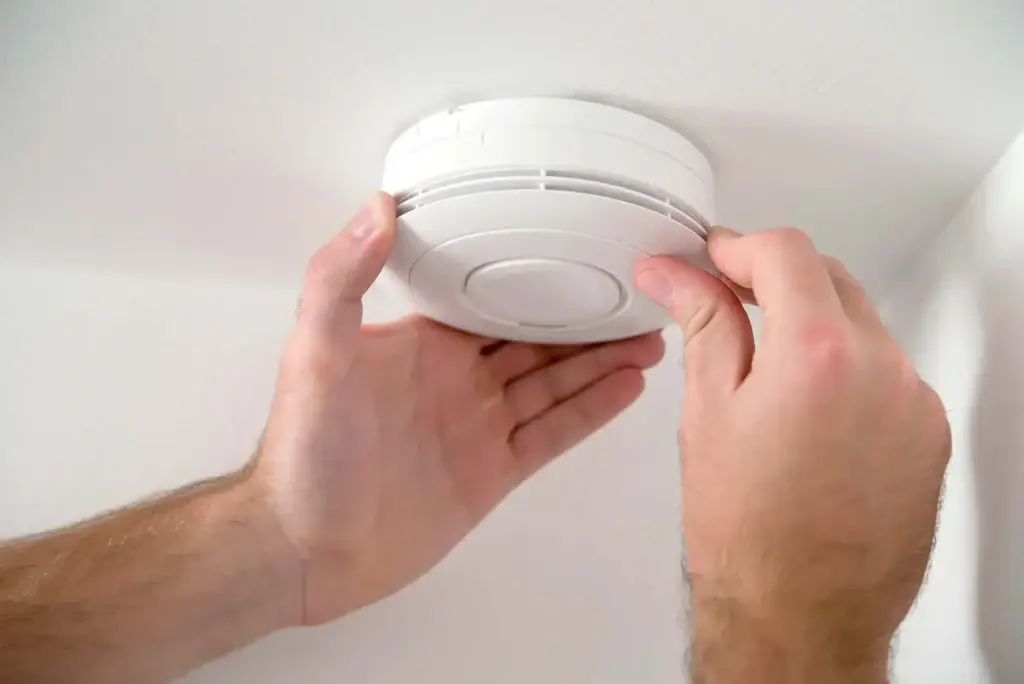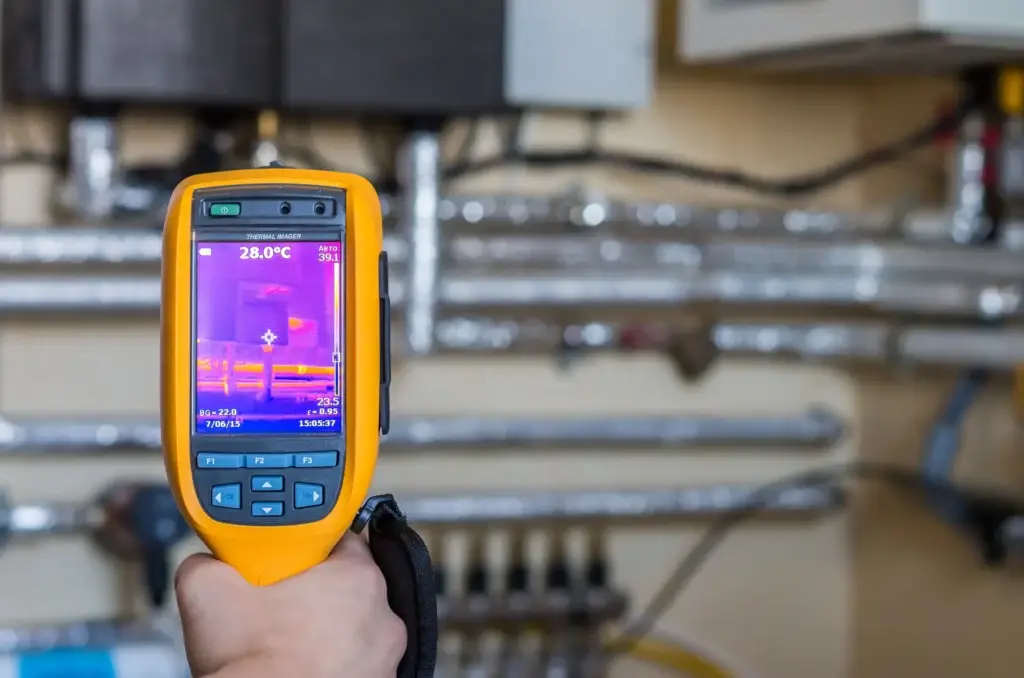Preventing property fires in the UK is crucial, given thousands of incidents annually, most of which are preventable through proactive measures. Key strategies for fire safety at home or work include regular fire risk assessments and having a clear emergency evacuation plan. Essential equipment like smoke alarms must be installed and maintained, with fire safety equipment regularly tested. It’s vital to maintain electrical wiring and appliances, avoid overloading sockets, and store flammable materials safely. Specific high-risk areas like kitchens require vigilance; never leave cooking unattended, and regularly clean appliances. Additionally, ensure escape routes are clear of clutter and take steps to secure your property against arson. Prioritising these measures significantly reduces fire risks, ensuring peace of mind.
Skip to:
Who is responsible for fire safety?
Fire safety in the UK
Fire safety is not something to take lightly. According to Home Office statistics, fire and rescue services in England attended over 150,000 fires in the year ending March 2023, with more than 26,000 occurring in homes and businesses. The consequences of a fire can be devastating, causing financial loss, emotional distress, the need for fire damage restoration and in worst cases, injury or loss of life.
The good news? Many fires are preventable. By taking proactive steps, you can significantly reduce the risk of fire in your home or business. Knowing the different UK fire classifications and the related fire extinguishers can help prevent disaster.
Who is responsible for fire safety?
If you own or manage a business property in the UK, you have a legal duty under the Regulatory Reform (Fire Safety) Order 2005 to ensure fire risks are minimised. This responsibility applies to:
- Employers
- Landlords
- Property owners
- Facilities managers
- Building managers
For homeowners and tenants, fire safety is a shared responsibility. Simple precautions can make all the difference in protecting your loved ones and your property.

10 steps to reduce your fire risk
1. Conduct a fire risk assessment
Fire prevention begins with preparation. Regularly assess your property for fire risks, identifying hazards such as overloaded electrical sockets, flammable materials, and obstructed exits. If you manage a business, this is a legal requirement, and your fire risk assessment should be reviewed periodically.
2. Install and maintain smoke alarms
Smoke alarms save lives. UK fire regulations require landlords and business owners to install smoke detection systems, but homeowners should also fit alarms on every floor of their property. Test them weekly and change batteries regularly.
3. Have an emergency plan and train your staff
If a fire occurs, do you and your staff or family members know what to do? Develop a clear evacuation plan, practice fire drills, and ensure everyone understands how to use fire extinguishers correctly.
4. Declutter and keep escape routes clear
Blocked exits and clutter can turn a small fire into a disaster. Keep hallways, fire exits, and stairwells free of obstructions to ensure a swift escape if needed.
5. Maintain electrical equipment and wiring
Faulty wiring and electrical appliances are a leading cause of fires in UK homes and businesses. Regularly inspect and maintain electrical systems, avoiding overloaded sockets and trailing cables. In commercial properties, ensure a qualified electrician carries out periodic inspections.
6. Store flammable materials safely
Flammable liquids and gases should be stored in designated areas, away from heat sources. In businesses that handle chemicals, appropriate safety procedures should be in place to minimise fire risks.
7. Test fire safety equipment regularly
Fire extinguishers, emergency lighting, sprinkler systems, and alarms must be tested routinely. If any faults are detected, repair or replace equipment immediately.
8. Reduce kitchen fire risks
Cooking appliances are a leading cause of household fires. Never leave cooking unattended, keep combustible items away from heat sources, and clean grease build-up from appliances regularly. In commercial kitchens, ensure extractor fans and ventilation systems are serviced frequently.
9. Secure your property against arson
Arson is a real threat, particularly to businesses. Keep bins and combustible materials away from the property, install security lighting, and ensure doors and windows are locked when the premises are unattended.
10. Keep emergency contact details visible
In the event of a fire, rapid response is crucial. Display emergency contact details clearly, including fire brigade numbers, keyholders, and insurance information.
In summary
While fire prevention measures require time and effort, they are far easier to implement than dealing with the consequences of a fire. Investing in fire safety is an investment in peace of mind.
At Ideal Response, we have been helping businesses recover from fire damage for over 20 years. If you need expert guidance on fire safety or fire damage restoration, contact us today for a free consultation.
Need to speak to a specialist urgently? Call 01622 926 505
Preventing property fires in the UK: Frequently asked questions
What are the essential steps for preventing property fires in the UK?
Essential steps for preventing property fires in the UK involve conducting regular fire risk assessments to identify hazards, installing and maintaining smoke alarms and other fire safety equipment, and creating a clear emergency escape plan. Key practices include ensuring electrical safety, storing flammable materials safely, reducing kitchen fire risks, keeping escape routes clear, and securing against arson.
How often should smoke alarms be tested and maintained in UK homes?
In UK homes, smoke alarms should be tested weekly to ensure they are fully operational. Batteries should be changed regularly, typically once a year, and the alarms themselves should be replaced according to the manufacturer’s guidelines, usually every ten years.
What are key tips for electrical fire safety at home or work?
For electrical fire safety, it’s crucial to regularly inspect and maintain electrical equipment and wiring, avoiding overloaded sockets and trailing cables. Ensure appliances are used according to manufacturer instructions, and in commercial properties, periodic inspections by a qualified electrician are legally required.
How can I reduce fire risks in my kitchen in the UK?
To reduce kitchen fire risks in the UK, never leave cooking unattended, especially when using high heat or oil. Keep all combustible items, such as tea towels and paper, away from heat sources, and regularly clean grease build-up from appliances, hobs, and extractor fans.
Why is a fire risk assessment important for property fire prevention?
A fire risk assessment is important because it is the foundational step in fire prevention, systematically identifying potential hazards like overloaded sockets, flammable materials, and obstructed exits. For businesses in the UK, it is a legal requirement under the Regulatory Reform (Fire Safety) Order 2005.
What should be included in a home or business fire escape plan?
A home or business fire escape plan should include clearly designated evacuation routes from all areas of the property, alternative escape options, and a designated safe meeting point outside. All occupants should practice regular fire drills and understand how to use fire extinguishers correctly.
How can I safely store flammable materials to prevent fires?
To safely store flammable materials, they should be kept in designated areas, away from any heat sources or potential ignition points. In businesses handling chemicals, specific safety procedures and appropriate storage facilities must be in place to minimise fire risks.

Kayleigh Owen - Technical Account Manager
With years of dedicated experience in the disaster recovery industry, Kayleigh Owen brings a precise and insightful approach to every project. Holding a BSc Hons Degree, Kayleigh specialises in construction and major loss, expertly navigating the complexities of large-scale fire and flood events. Having spent her entire industry career at Ideal Response, she has honed a deep understanding of what it takes to restore properties and lives with efficiency and empathy. Kayleigh believes that meticulous planning and clear communication are the cornerstones of transforming disaster into recovery, ensuring every client receives not just a solution, but true peace of mind.





















